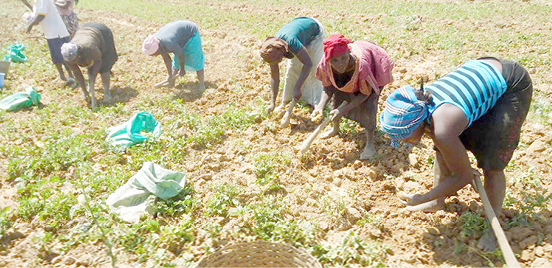AWARD fellows seek gender balance in agric policies
Nine policy fellows from Nigeria participating in the Gender Responsive Agriculture Systems Policy (GRASP) under the auspices of the African Women in Agricultural Research and Development (AWARD) have emphasized the need for gender-responsive solutions to agricultural policies in Nigeria. The fellows — a group of Nigerian women and scientists in mid-career during the AWARD Side […]

Female farmers
Nine policy fellows from Nigeria participating in the Gender Responsive Agriculture Systems Policy (GRASP) under the auspices of the African Women in Agricultural Research and Development (AWARD) have emphasized the need for gender-responsive solutions to agricultural policies in Nigeria.
The fellows — a group of Nigerian women and scientists in mid-career during the AWARD Side Session of the 2024 Gender and Inclusion Summit in Abuja emphasized the need for responsive gender policy to boost Nigerian agricultural systems.
The policy fellows are participating in the GRASP fellowship under mentorship.
Following the mentorship training and catalytic financing, the fellows are required to carry out a Policy Innovation Project (PIP) to shed light on gender disparities and offer policy recommendations for gender-appropriate agriculture policies.
While speaking on the theme “Amplifying the Blind Spots; Gender Inclusion at the Centre of National Agricultural Policy”, the fellows spotlighted the urgent need for gender inclusion in national agricultural policies.
One of the fellows, Ms Aisha Hadeja, Associate Partner, Sahel Consulting Agriculture and Nutrition Limited, who is working on a PIP that seeks to enhance institutional capacity for inclusive food system transformation, said persistent systemic institutional capacity gaps hinder women’s contributions to agricultural productivity, food security, and rural development.
Dr Temitayo Adeyemo and Dr Sherifat Adegbesan, Lecturers at the University of Ibadan and Edo State College of Agriculture and Natural Resources respectively said their PIPs are expected to impact agricultural systems, particularly in the area of fisheries and aquaculture.
Another Fellow, Dr Patricia Ukegbu, Senior Lecturer, Michael Okpara University of Agriculture, Umudike stated that her PIP is focused on integrating gender-responsive adolescent nutrition considerations in the National Policy of Food and Nutrition in Nigeria.
On her part, Mrs Roshidat Oyinlola, Assistant Chief Land Resource Officer, Federal Ministry of Agriculture and Food Security noted Nigeria faces significant post-harvest losses, estimated at over $9 billion annually, with fruits and vegetables accounting for more than 50% of these losses.
She emphasized the need to integrate gender-responsive strategies into the National Agricultural Sector Food Security and Nutrition Strategy to reduce post-harvest losses and improve food security.
Dr Clara Ifeanyi-Obi who is working on a policy innovation project said her PIP is expected to impact agricultural systems, particularly in the area of climate change.
She explained that to bridge the gap between policy and practice, this project will develop a G-SMART monitor. “The tool will utilize a SMART framework with defined key indicators to provide real-time assessment and tracking of implementation of gender commitments in climate change-related policies within Nigeria’s agricultural sector”.
